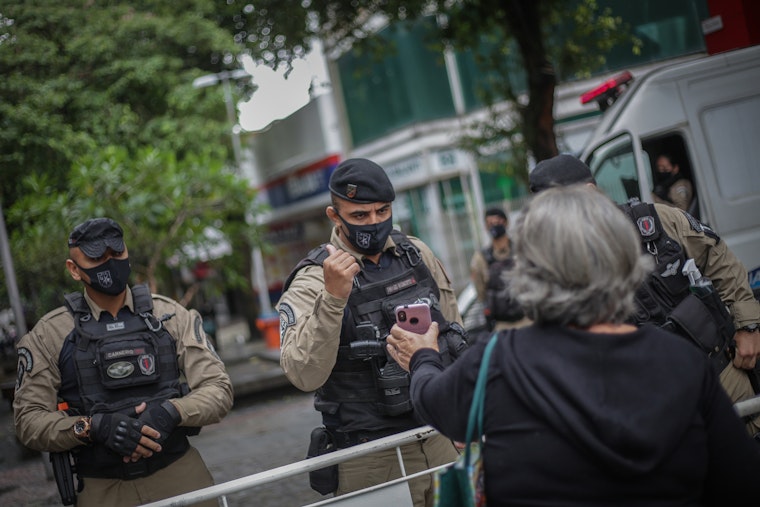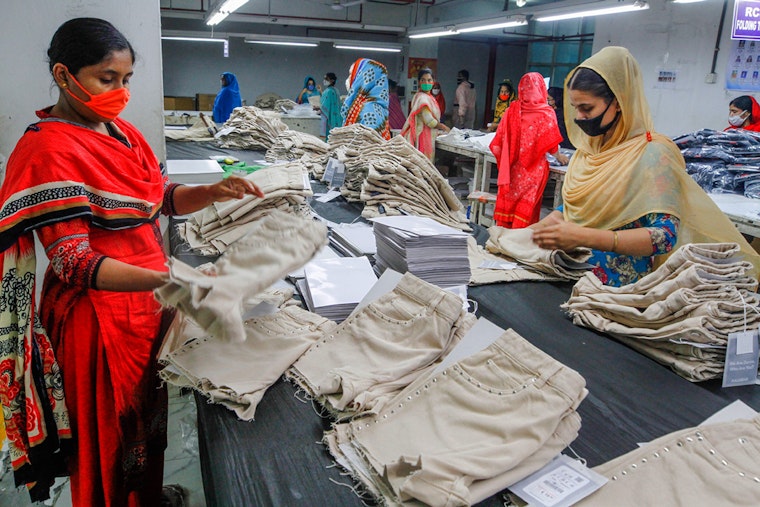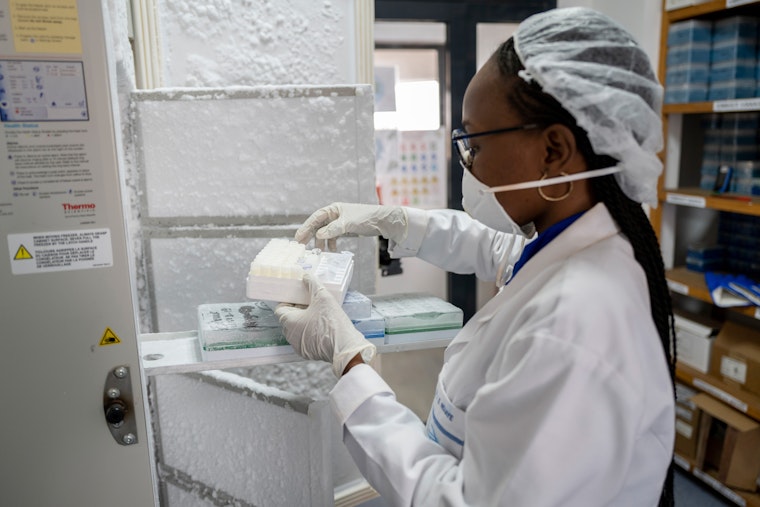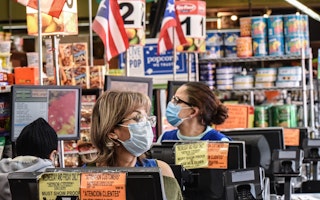Demanding a Just COVID-19 Response
By Laleh Ispahani & Jonathan Cohen

There is hardly an issue on which the Open Society Foundations work that has not been affected by the COVID-19 pandemic. Our grantees working in migration, labor, and employment rights; economic justice; women’s rights; education; and independent journalism are as gripped by this crisis as those working in public health. While the full severity and outcome of the pandemic remain unknown—with Latin America now emerging as a major source of concern—there are clear threats to the values of open society, particularly as societies adopt authoritarian measures that often exceed any public health purposes.
Open Society’s response recognizes the range of diverse and intersecting risks facing communities affected by COVID-19. Many of our partners are working to defend civil and political freedoms from government actions that reflect partisan political, commercial, and security considerations, rather than an evidence-based commitment to public health. We will continue to join in demands for a more just society, where measures like paid sick leave, childcare benefits, continued access to education, and debt relief are understood to be as critical to human health as universal access to health care.
Our response to COVID-19 reflects our commitment to supporting long-term social transformation while doing everything in our power to mitigate the immediate and escalating harms brought on by the disease. In addition to our continuing support for civil society and progressive governments—which can be seen, in part, through the work of our local foundations—we have focused additional funding on four goals: resisting populist agendas; protecting refugees, migrants, and asylum seekers; supporting low-wage workers and pro-labor reforms; and ensuring access to essential medical tools developed with public funds.

Resisting Populist Agendas
Across the world, we have been witnessing authoritarian leaders using the pandemic to manipulate and discredit democratic governance while either downplaying the pandemic or exaggerating it for greater control.
We can see this cynical aggregation of power in places such as China, Iran, Hungary, Brazil, and the United States. We are responding by funding civil society organizations to oppose efforts to use emergency measures to consolidate political power rather than to protect public health. In doing so, we are exposing and advocating against the racist and xenophobic scapegoating of Roma in Europe, migrants, people of Asian descent, and other so-called foreign threats. We are amplifying the voices of public officials who are combating disinformation about COVID-19 and public health, alongside the voices of affected groups.
COVID-19 has unleashed both the potentials and perils of digital technology—and we must push back against governmental and corporate use of tracking applications, immunity certificates, and other technologies that infringe on individual human rights without a clear public health benefit. We are supporting research into contact tracing apps and immunity passports in the Global South, where datasets could be used by both authoritarian and populist governments to exert social control. We must act now to put mechanisms in place to ensure the wise and beneficial use of technology, rather than its abuse.

Protecting Refugees, Migrants, and Asylum Seekers
Refugees, migrants, and asylum seekers are among those most in need of protection during the pandemic. Thousands of refugees remain trapped in dangerously overcrowded camps throughout Europe. Iran hosts nearly a million Afghan refugees as its health system strains to cope with new infections.
Undocumented migrants the world over face cruel conditions of confinement, or economic ruin, as a result of the collapse of informal economies. Relatedly, their risk of experiencing homelessness and/or police abuse is increased, too. Our funding will push back against those who would force refugees, migrants, and asylum seekers to remain in deplorable conditions that violate their fundamental rights and put their health at severe risk. We are providing support to local health care infrastructure, as well as urgent support for refugees and migrants in camps and informal settlements across Greece, Italy, and Spain.
We are also supporting groups that advocate for access to COVID-19 information, particularly in the Arab region, where health care services are inaccessible to many migrants due to legal, regulatory, and practical barriers. These groups are working to ensure that migrants have access to information in their own languages and will be able to access legal support about health and labor.

Supporting Low-wage Workers and Pro-labor Reforms
It is shameful that it took a crisis like COVID-19 to expose fatal gaps in worker protection in even the wealthiest societies. Doctors and medical staff were thrown into hazardous situations without protective gear. Workers deemed essential in other sectors, such as food processing or home delivery, faced health risks from lack of occupational safety standards and infection control. Workers in the informal or “gig” economy were among the most likely to be put in economic jeopardy by necessary mitigation efforts such as lockdowns and social distancing. Alternatively, some were compelled to continue working, even if they showed signs of being symptomatic.
COVID-19 has tested not only our health system but also our care economy, placing unprecedented strain on caregivers and care workers who are disproportionately women and girls. Care work is relentless—it does not let up, and all other work depends on it. Migrant workers across the world are a critical source of care, as nannies, maids, and sex workers.
Our work supports the only international federation of domestic workers and the many thousands of affiliated unions of domestic workers across the globe, as well as women workers at the bottom of global supply chains for manufacturing—particularly in the apparel sector. We are helping to fund groups that are worker-led and that build the long-term power and voice of worker communities—from the Caribbean and Pakistan to the refugee camps of Lebanon and Jordan. We also support sex workers, who are some of the most stigmatized and criminalized workers in the gendered care economy, and who have been excluded from government assistance even as they face blame and scapegoating for COVID-19 infection.

Ensuring Access to Essential Medical Tools Developed with Public Funds
Any vaccines, treatment, or test for COVID-19 must be universally and equitably available to all. To help ensure this, we are supporting civil society organizations that demand broad and long-term access to publicly funded medical innovation. We are supporting advocacy in the United States and Europe to guarantee the accessibility and affordability of COVID-19 treatments and vaccines—including strong public oversight, ownership of existing public funds, and calls for a “People’s Vaccine” that is available free of charge.
Our social impact investing arm, the Soros Economic Development Fund, intends to invest in the manufacturing of therapeutic drugs and future vaccines for global distribution—not concentrated in the Global North—and promoting affordable pricing, scalability, transportation, and simplicity of delivery.
In the United States, Black and Latino Americans are more than twice as likely as whites to die from COVID-19. In some states, the disparity is much greater. In addition to addressing the disproportionate impact of the virus on Black communities, by holding policymakers and government accountable for the equitable distribution of resources, we are supporting advocacy for transparent racial data collection for Black communities as well as efforts to highlight how data and algorithms are created and used in ways that raise serious civil rights concerns.
The Beginning, Not the End
Over six months into the COVID-19 pandemic, we are only beginning to fully grasp the magnitude and impact of this disease. The actions we outline above represent the beginning of what will be a long effort—by Open Society and other foundations and governments—to support the brave work of civil society actors who are demanding a just COVID-19 response. We will remain steadfast in our support to civil society to help meet the needs, and protect the rights, of those who are sure to be most deeply affected by this pandemic, whose voices are too often ignored.

Laleh Ispahani is managing director of Programs at the Open Society Foundations.

Until November 2021, Jonathan Cohen was the director of the Open Society Public Health Program.
